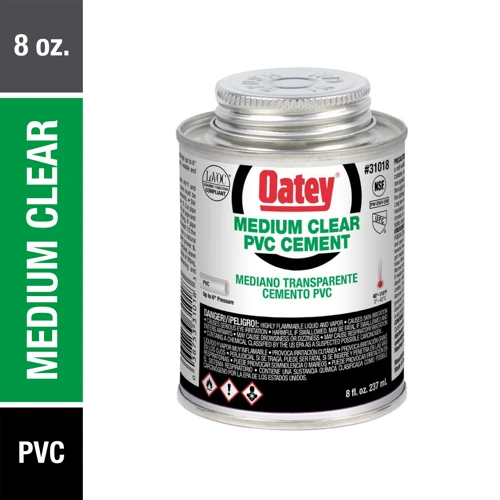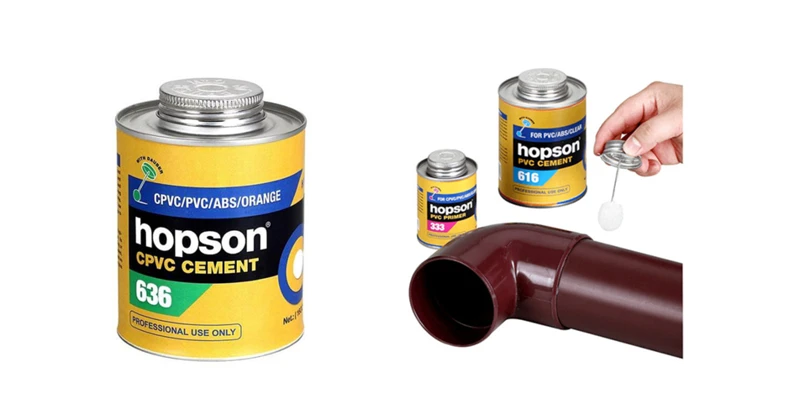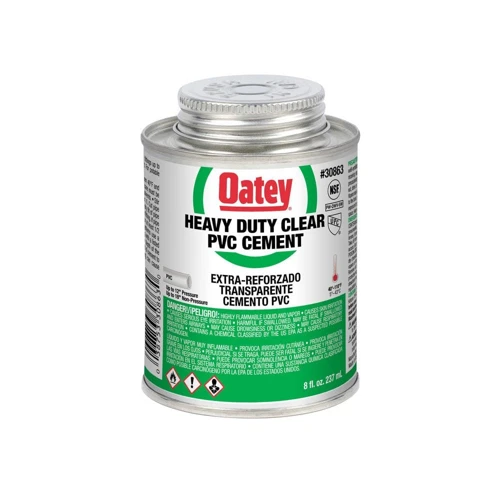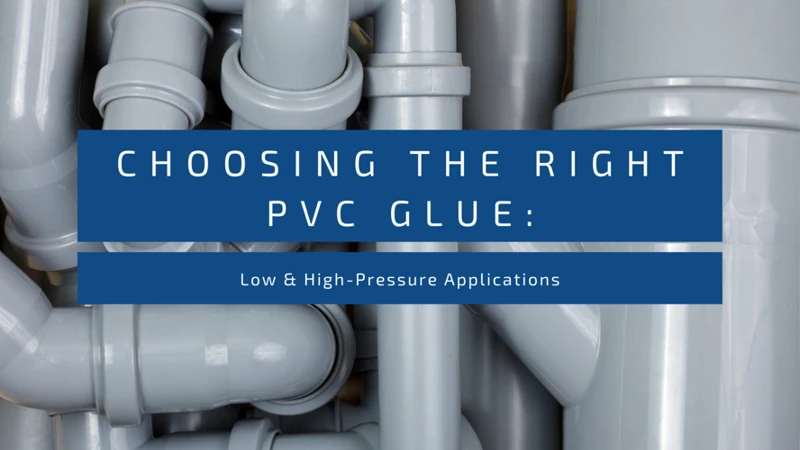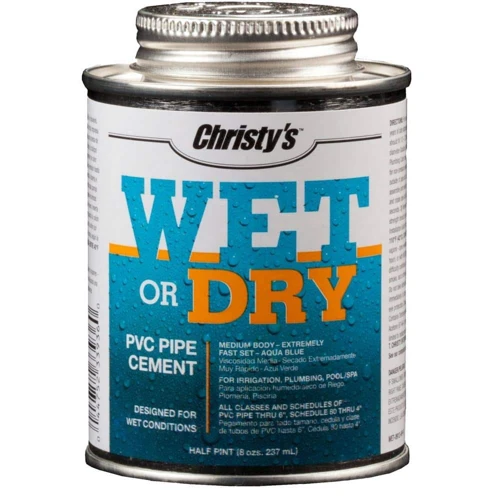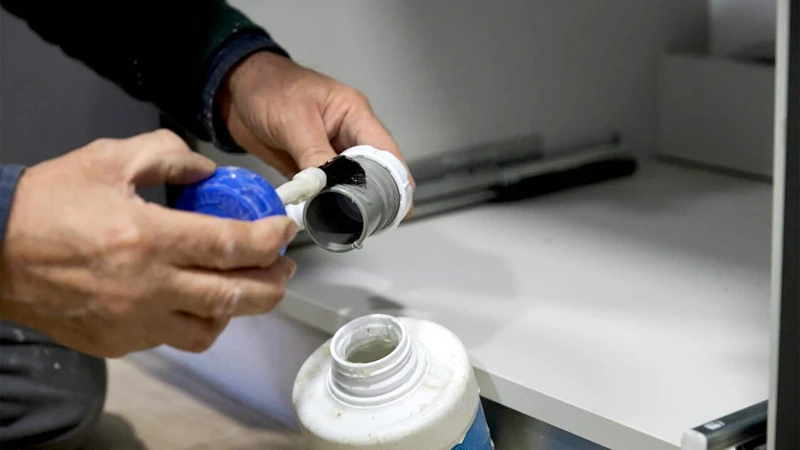As a DIY enthusiast or professional plumber, you know that working with PVC pipes requires the right glue to ensure they stay put. But with so many options on the market, it can be perplexing to determine which is the strongest PVC glue for your needs. In this article, we’ll dive deep into the world of PVC glue and help you select the strongest adhesive option. We’ll examine the different factors you should consider when choosing a PVC glue and also provide tips on how to use them efficiently. So, let’s get started!
What Is PVC Glue?
PVC glue is an essential adhesive used to join PVC pipes and fittings in plumbing systems. It creates a strong, durable bond that ensures the pipes remain leak-free over time. PVC glue is composed of a mixture of solvents, and it dissolves the surfaces of the PVC material that it comes into contact with. This results in a molecular-level fusion of the materials, which creates an incredibly strong bond that can last for decades. Understanding how PVC glue works and its differences from PVC cement can help you make informed decisions when selecting the right adhesive for your project. Learn more about PVC glue here.
How Does PVC Glue Work?
PVC glue, also known as PVC cement, is a solvent-based adhesive that is used to bond PVC pipes and fittings together. The glue works by chemically melting the surfaces of the PVC material and fusing them together.
To use PVC glue, the two surfaces that are being bonded together must first be cleaned and primed. This is typically done using a specialized cleaner and primer designed for use with PVC glue. The cleaner removes any dirt or debris on the surface of the PVC, while the primer roughens the surface in preparation for the glue to be applied.
Once the surfaces have been cleaned and primed, the PVC glue can be applied. The glue is applied to one surface and the two surfaces are then pressed together firmly. The glue then begins to work its magic, melting the PVC surfaces and fusing them together.
It is important to note that PVC glue has a very strong odor and is highly flammable, so it should always be used in a well-ventilated area and away from any sources of heat or flame.
PVC glue is a highly effective adhesive for bonding PVC pipes and fittings together. By chemically melting the surfaces of the PVC material and fusing them together, PVC glue creates a strong and long-lasting bond.
If you want to know more about how to re-glue PVC pipes, you can check our article on how to re-glue PVC pipe.
What Are the Differences Between PVC Glue and PVC Cement?
PVC glue and PVC cement are terms that are often used interchangeably, but there are some differences between the two. Here are the main differences:
- Composition: PVC glue is typically a type of solvent-based adhesive that contains PVC resin and other chemicals that dissolve the surfaces being joined. On the other hand, PVC cement is a solvent-based adhesive that is made from a combination of PVC resin and solvents that soften and melt the surfaces being joined.
- Use: PVC glue is often used for bonding PVC pipes and fittings, while PVC cement is commonly used for joining PVC pipes and fittings as well as bonding PVC to other materials such as metal, wood, concrete, and fiberglass.
- Strength: PVC cement is generally stronger than PVC glue since it is designed to melt the surfaces being joined and fuse them together, while PVC glue works by dissolving the surfaces and then bonding them together.
- Drying Time: PVC glue usually dries faster than PVC cement, with most PVC glues setting within a few minutes and drying completely within 24 hours. PVC cement, on the other hand, can take up to 30 minutes to set and several hours to dry completely.
- Color: PVC glue is typically clear or opaque, while PVC cement is usually tinted to match the color of the PVC being joined.
Knowing the difference between PVC glue and PVC cement can help you determine which product to use for your specific project. If you need to bond PVC to another material, like wood or metal, then PVC cement is likely to be the better option since it is stronger and can be used on a wider variety of surfaces. However, if you’re working solely with PVC pipes and fittings, then PVC glue may be sufficient and faster-drying than PVC cement.
If you want to know more about gluing PVC to other materials, you may want to check out our article on how to glue PVC to wood or how to glue PVC sheet to plywood.
Importance of Using the Right PVC Glue
Using the right PVC glue is crucial in ensuring the strength and durability of your PVC pipe connections. The wrong glue can result in weak joints that can easily come apart, causing leaks and other issues.
One of the main advantages of using the right PVC glue is that it can provide a secure and long-lasting bond between PVC pipes and fittings. This is particularly important in applications that involve high pressure, heat, or chemical exposure. For instance, in a plumbing system, using the wrong type of glue can lead to burst pipes or contaminated water.
It’s also important to choose the right glue based on the type of project you’re working on. For instance, if you’re joining PVC pipes to ABS pipes, you’ll need to use a special type of glue that’s designed for this specific use. Similarly, if you’re working with FRP panels, you’ll need to choose a glue that’s compatible with this material.
When you use the right PVC glue, you can also save time and money in the long run. This is especially true when you’re using a strong and reliable glue that can withstand different types of stress and environmental factors.
Ultimately, using the right PVC glue is essential to ensuring the integrity and safety of your project. Whether you’re working on a DIY project at home or a commercial construction project, it’s important to choose a glue that meets your specific needs. To learn more about how to glue PVC to ABS or other materials, check out our helpful guides on these topics.
The Strongest PVC Glue Options
When it comes to choosing the right PVC glue, there are a plethora of options available. However, not all PVC glues are created equal, and selecting the strongest adhesive is crucial to ensure a strong bond between pipes. Let’s take a look at some of the top PVC glue options available in the market, each with its unique features and benefits.
Oatey PVC Cement
Oatey PVC Cement is a popular choice for bonding PVC pipes and fittings in plumbing, irrigation, and pool/spa applications. This cement is a high-strength formula that can be used for both pressure and non-pressure systems. It is also suitable for PVC foam core pipe and cellular core pipe.
One of the key features of Oatey PVC Cement is its fast-setting time. It sets in just 30 minutes, making it ideal for quick repairs or installations. Additionally, this cement has a low VOC (volatile organic compound) formula, making it more eco-friendly than some other options.
Here is a table for a quick reference to the features of Oatey PVC Cement:
| Feature | Description |
|---|---|
| Drying Time | 30 minutes |
| Set Time | 2 hours |
| Bond Strength | Meets ASTM D2564 |
| Waterproofing | Yes |
| UV Resistance | Not specified |
| Viscosity | Medium |
| Price | Mid-range |
When using Oatey PVC Cement, it is important to follow the manufacturer’s instructions carefully. The surfaces to be bonded should be clean, dry, and free of any grease or debris. Apply the cement evenly to both surfaces using an applicator brush or dauber. It is recommended to assemble the parts within 3 minutes of application, as the cement sets quickly.
Internal link: If you need to know how to glue PVC to ABS, be sure to check out our article on how to glue PVC to ABS.
Christy’s Red Hot Blue Glue
There are several options in the market for the strongest PVC glue, and one of these is Christy’s Red Hot Blue Glue. This glue is commonly used for PVC pipes and fittings and is known for its fast-setting time. Once applied, it takes around 15 seconds to dry and sets in just a few minutes, making it an excellent choice for quick repairs.
Christy’s Red Hot Blue Glue is a popular choice among contractors and is designed for use in both wet and dry applications. Additionally, it is suitable for use with irrigation, electrical conduits, and pool and spa applications.
This PVC glue has a high bonding strength and creates permanent bonds that are resistant to heat and chemicals. It works exceptionally well with PVC pipes and fittings and ensures a tight seal that prevents leaks and drips.
When using Christy’s Red Hot Blue Glue, it is essential to follow the manufacturer’s instructions carefully. The glue should be used in a well-ventilated area and should not be ingested or inhaled. It is important to wear protective gear such as gloves and eye protection to prevent contact with skin and eyes.
Below is a table summarizing the features of Christy’s Red Hot Blue Glue:
| Features | Details |
|---|---|
| Drying Time | 15 seconds |
| Set Time | A few minutes |
| Bond Strength | High |
| Waterproof | Yes |
| UV Resistant | No |
| Viscosity | Medium |
| Price | Mid-range |
If you need fast-drying and permanent bonds for your PVC pipes and fittings, Christy’s Red Hot Blue Glue is an excellent option. However, it is important to consider all the factors carefully to choose the best PVC glue for your needs. You can read more in the article on How to Glue PVC Pipe.
Weld-On 711 PVC Cement
Weld-On 711 PVC Cement is a high-strength product that is designed for bonding PVC pipes and fittings. It is a two-part product that consists of a solvent and a resin, which when combined together create a strong bond that is resistant to impact, chemicals, and temperature changes. Weld-On 711 PVC Cement is ideal for use in high-pressure applications, making it a popular choice for plumbing and HVAC systems.
Features:
- Fast-drying
- Easy to apply
- High bond strength
- Chemical and impact resistant
- Can withstand extreme temperatures
Weld-On 711 PVC Cement is also waterproof and has high UV resistance, which makes it ideal for use in outdoor applications. This product is specially formulated to provide a strong bond that is able to withstand the harsh elements and extreme temperatures that can be experienced outdoors.
Benefits:
- Creates a permanent bond that is resistant to impact, chemicals, and temperature changes
- Easy to apply and fast-drying
- Ideal for use in high-pressure applications such as plumbing and HVAC systems
- Waterproof and has high UV resistance, making it ideal for outdoor applications
When choosing the right PVC glue, it is important to consider the specific needs of your project. Weld-On 711 PVC Cement is a great choice for those looking for a high-strength glue that can withstand harsh conditions. Its fast-drying and easy-to-apply formulation makes it a popular choice for professional plumbers and DIY enthusiasts alike. However, due to its high strength and chemical composition, special precautions should be taken when using Weld-On 711 PVC Cement.
Safety Precautions:
- Always wear protective gloves, eyewear and clothing when working with this product
- Avoid inhalation of vapors by using in a well-ventilated area
- Do not use on materials other than PVC
Weld-On 711 PVC Cement is a top choice for those looking for a high-strength PVC glue that is ideal for use in high-pressure and outdoor applications. Its unique formulation ensures that it provides a long-lasting and durable bond that is resistant to impact, chemicals, and temperature changes.
Gorilla PVC Cement
One of the strongest PVC glue options available is Gorilla PVC Cement. This PVC cement boasts a fast-drying time and excellent bond strength, making it ideal for a wide range of PVC applications.
Here is a breakdown of some of the factors to consider when choosing Gorilla PVC Cement:
| Factors to Consider | Gorilla PVC Cement |
|---|---|
| Drying Time | 30 minutes for handling, 2 hours for pressure testing |
| Bond Strength | Medium |
| Waterproofing | Yes |
| UV Resistance | No |
| Viscosity | Medium |
| Price | Mid-range |
When choosing a PVC glue, it’s important to consider your specific needs and application. Gorilla PVC Cement may not be the strongest option in terms of bond strength, but it does offer quick drying time and waterproofing capabilities.
Gorilla PVC Cement should be used according to the manufacturer’s instructions and safety precautions. This includes wearing gloves and protective eyewear, working in a well-ventilated area, and avoiding skin contact.
Gorilla PVC Cement is a reliable option for those looking for a fast-drying and waterproof PVC glue. However, if bond strength is a top priority, other options on the list, such as Oatey PVC Cement or Weld-On 711 PVC Cement, may be more suitable.
Harvey’s PVC Cement
When it comes to PVC glue, Harvey’s PVC Cement is a popular choice for its strong bond and versatility. This glue is made with a blend of PVC resin and solvent, making it a great adhesive for bonding PVC pipes and fittings. It comes with a convenient brush applicator, making it easy to apply to even the smallest of surfaces.
Features:
- Dries quickly
- Provides a strong and permanent bond
- Works well on both rigid and flexible PVC
- Can withstand temperatures up to 180°F
- Resistant to water and most chemicals
- Compliant with NSF/ANSI 61-G
- Can be used on both pressure and non-pressure PVC applications
Harvey’s PVC Cement is suitable for a variety of applications, including plumbing, irrigation, and pool installations. It boasts a drying time of 15 minutes and a full cure time of 24 hours. This glue creates a strong bond that can withstand pressure and stress, making it perfect for demanding applications.
When selecting a PVC glue, it’s important to consider factors like drying time, bond strength, and waterproofing. The Harvey’s PVC Cement checks all these boxes and is a great option for those looking for a reliable adhesive.
Tip: Before using Harvey’s PVC Cement, ensure the PVC surfaces are clean, dry, and free of any dirt or debris. This will ensure a proper bond and prevent any leaks.
While Harvey’s PVC Cement is specifically designed for PVC bonding, it’s always important to test the adhesive on a small area before applying it to the entire surface to ensure compatibility.
Internal html link: If you’re interested in learning how to make your own glue, check out our article on how to make polyvinyl acetate glue.
Factors to Consider in Choosing the Strongest PVC Glue
In order to ensure a strong and secure bond on your PVC pipes, it is essential to choose the right PVC glue. There are several factors to consider when selecting the strongest PVC glue for your project. By taking into account factors such as drying time, bond strength, waterproofing, UV resistance, viscosity, and price, you can make an informed decision on which glue to use. To make the process easier, we have compiled a list of top-rated PVC glues and the factors to consider when choosing the right one for your project. Whether you are working on FRP panels, PETG or Traxxas Tires, selecting the strongest PVC glue can make all the difference in the success of your project.
Drying Time and Set Time
When it comes to choosing the strongest PVC glue, one of the important factors to consider is the drying time and set time. Different PVC glues require different amounts of time to dry and set, so it is important to choose a PVC glue that will fit your specific needs.
Drying Time: This refers to the amount of time it takes for the glue to dry on the surface after it has been applied. The drying time for PVC glue can vary from a few minutes to several hours, depending on the particular brand and formulation.
Set Time: This refers to the amount of time it takes for the glue to fully bond two PVC surfaces together. Set time can take anywhere between a few hours to several days, depending on the specific PVC glue.
To help you make a more informed decision, here is a table showcasing the drying time and set time for some of the strongest PVC glues available on the market.
| PVC Glue | Drying Time | Set Time |
|---|---|---|
| Oatey PVC Cement | 15 minutes | 2 hours |
| Christy’s Red Hot Blue Glue | 30 seconds | 15 minutes |
| Weld-On 711 PVC Cement | 20 minutes | 3 hours |
| Gorilla PVC Cement | 10 minutes | 24 hours |
| Harvey’s PVC Cement | 30 minutes | 2 hours |
As you can see from the table, Christy’s Red Hot Blue Glue has the fastest drying time, which makes it a great option if you need to work quickly. However, it has a shorter set time compared to the other glues. Oatey PVC Cement and Harvey’s PVC Cement have longer drying times, but they have a stronger and more reliable bond once fully set. Gorilla PVC Cement has a much longer set time, but it is waterproof and has UV resistance, making it a good choice for outdoor applications.
Note: If you are looking for information on other types of glues, such as how to glue PETG or what kind of glue to use on FRP panels, check out our other articles on those topics.
It is important to consider the drying time and set time when choosing the strongest PVC glue for your project. Take into consideration the specific needs of your project and choose the PVC glue that will give you the best bond for your specific PVC application.
Bond Strength
When it comes to choosing the strongest PVC glue, bond strength is a crucial factor to consider. It refers to the adhesive’s ability to create a strong and durable bond between two pieces of PVC.
Different brands of PVC glue offer varying bond strengths, and it can be challenging to choose the one that fits your specific needs. To help you out, we’ve compiled a list of some of the strongest PVC glues available on the market and their bond strengths.
| Product | Bond Strength |
|---|---|
| Oatey PVC Cement | 4500 PSI |
| Christy’s Red Hot Blue Glue | 3150 PSI |
| Weld-On 711 PVC Cement | 4000 PSI |
| Gorilla PVC Cement | 3500 PSI |
| Harvey’s PVC Cement | 2000 PSI |
Oatey PVC Cement is known for its impressive bond strength of 4500 PSI, making it one of the strongest PVC glues on the market. Christy’s Red Hot Blue Glue follows closely with a bond strength of 3150 PSI. Weld-On 711 PVC Cement offers a bond strength of 4000 PSI, while Gorilla PVC Cement offers a bond strength of 3500 PSI. Harvey’s PVC Cement, on the other hand, has a bond strength of 2000 PSI, which may not be ideal for some applications.
When choosing the right PVC glue for your project, it’s essential to look at its bond strength and ensure it matches your specific needs. If you’re uncertain about the right PVC glue to use, you may consider seeking advice from a professional.
Note: If you’re also curious about what type of glue to use on FRP panels, check out our article on “What Kind of Glue to Use on FRP Panels?“. And if you’re interested in how to glue PETG, you may check our article “How to Glue PETG?“.
Waterproofing
When considering the strongest PVC glue for your project, one of the factors that you need to keep in mind is waterproofing. This feature is especially crucial if you will be using the PVC pipes or fittings for plumbing purposes. The waterproofing ability of your chosen glue ensures that the adhesion will remain strong and will not break down even when exposed to moisture.
Here are some PVC glues with excellent waterproofing abilities:
- Oatey PVC Cement: This PVC cement has a low-VOC formula that makes it safe to use in confined areas. It creates a strong bond that is resistant to water and chemicals.
- Christy’s Red Hot Blue Glue: This glue is designed to provide excellent waterproofing for PVC pipes used in swimming pools, hot tubs, and other outdoor installations. It can also be used for potable water systems.
- Weld-On 711 PVC Cement: This is another PVC cement that offers superior waterproofing capabilities. It can be used on both rigid and flexible PVC pipes and fittings, making it a versatile option for different applications.
- Gorilla PVC Cement: The Gorilla PVC cement is specifically designed for use in wet conditions, making it perfect for outdoor plumbing projects. It forms a strong, waterproof bond that is resistant to various chemicals and solvents.
- Harvey’s PVC Cement: Like the other PVC cements on this list, Harvey’s PVC cement is known for its excellent waterproofing ability. It creates a strong bond that is resistant to water, solvents, and chemicals.
When selecting a PVC glue, it’s essential to check the label or product description to ensure that it is waterproof. Keep in mind that some products may have varying degrees of waterproofing. For instance, some may be classified as “water-resistant,” while others are “waterproof.” Always select a product that matches your needs.
If you will be using the PVC glue for an outdoor project, make sure to opt for a glue with excellent UV resistance. This feature ensures that the glue won’t break down when exposed to sunlight and other outdoor elements.
Note that when gluing PVC tires, you need to use a different type of adhesive. You can find out more about this topic in our article on how to glue Traxxas tires.
UV Resistance
UV resistance is an important factor to consider when choosing the strongest PVC glue for your project. Exposure to ultraviolet (UV) light can cause PVC pipes to degrade, resulting in failure of the bond over time. To ensure the longevity of your project, it’s important to choose a PVC glue that offers UV resistance.
Here are some PVC glues that offer UV resistance:
- Oatey PVC Cement: This PVC glue has a medium set time and is ideal for bonding PVC pipes in all weather conditions. It also offers good UV resistance, making it a great option for outdoor projects.
- Christy’s Red Hot Blue Glue: This glue is known for its high bond strength and fast set time. It also offers good UV resistance, making it an excellent choice for both indoor and outdoor projects.
- Weld-On 711 PVC Cement: With excellent bonding strength and fast set time, this PVC glue is ideal for projects that need to be completed quickly. Additionally, it offers good UV resistance for outdoor projects.
- Gorilla PVC Cement: This heavy-duty PVC glue offers a strong and durable bond. It also features good UV resistance, making it suitable for outdoor use.
- Harvey’s PVC Cement: This glue has a medium set time and is perfect for bonding PVC pipes in all weather conditions. It also offers good UV resistance, making it ideal for outdoor projects.
When selecting a PVC glue based on UV resistance, it’s important to keep in mind that no glue is completely resistant to UV light. However, choosing a glue with good UV resistance will significantly increase the lifetime of the bond.
Other factors to consider when choosing the strongest PVC glue:
- Drying Time and Set Time
- Bond Strength
- Waterproofing
- Viscosity
- Price
By considering all these factors, you’ll be able to choose the strongest PVC glue for your project with confidence.
Viscosity
When choosing the strongest PVC glue, it is important to consider its viscosity. Viscosity refers to the thickness or consistency of the glue. Different PVC glues have varying viscosities depending on the manufacturer and purpose.
Here are some points to consider when it comes to viscosity:
- Higher viscosity: PVC glue with high viscosity is thicker and has a slow flow rate. They are ideal for filling gaps and bonding large surfaces. They take longer to dry, but they are stronger and perfect for bonding uneven surfaces.
- Low viscosity: Glue with lower viscosity is runny and less thick; they are suitable for bonding small surfaces and intricate piping systems. They dry faster, and their bond strength is less than that of high-viscosity adhesives.
- Middle viscosity: The intermediate viscosity is suitable for a variety of piping and plumbing needs. They are ideal for joints and fittings that require strong, permanent bonds.
It is essential to choose the right viscosity of PVC glue for your project. If you use glue that is too thick or too runny, you may not get the desired results. Remember that the viscosity of the PVC glue affects the bond strength, drying time, and ease of application.
When using high-viscosity PVC glue, apply it evenly and spread it out over the surface before joining the pipes. For low-viscosity glue, use it sparingly, so you do not create a mess. For intermediate viscosity, use as needed to bond the PVC pipes or fittings together.
Always read the manufacturer’s instructions for the proper viscosity glue for your needs. Remember that the viscosity of the glue can make a significant difference in the success of your project.
Price
Price is an important factor to consider when choosing the strongest PVC glue. Here is a table showing some of the most popular PVC glues and their approximate prices:
| Brand | Price (approx.) |
|---|---|
| Oatey PVC Cement | $5-$10 |
| Christy’s Red Hot Blue Glue | $10-$15 |
| Weld-On 711 PVC Cement | $10-$15 |
| Gorilla PVC Cement | $8-$12 |
| Harvey’s PVC Cement | $5-$10 |
Note that these prices may vary depending on where you purchase the glue and the quantity you are buying. It is important to consider the price of the glue alongside other factors like drying time, bond strength, and waterproofing. While it may be tempting to opt for the cheapest option, it is important to remember that a high-quality PVC glue can save you money in the long run by preventing leaks and other damage to your pipes. It is recommended to invest in a reputable brand that meets your specific needs, rather than simply opting for the cheapest option available.
How to Choose the Strongest PVC Glue
When it comes to choosing the strongest PVC glue, it can be overwhelming to decide which one to use. Here is a step-by-step guide to help you choose the right adhesive for your project.
Step 1: Determine the Type of Project
Before choosing an adhesive, consider what you will be using it for. If you are working on a plumbing project, you will need an adhesive that is specifically designed for use with PVC pipes. If you are working on a project that will be exposed to sunlight, you may need an adhesive that offers UV resistance.
Step 2: Consider Set and Drying Time
Different adhesives have different set and drying times. If you are on a tight timeline, you will want to choose an adhesive that sets and dries quickly. However, if you have more time to work on your project, a slower-drying adhesive may be a better option.
Step 3: Look for Waterproofing and Bond Strength Features
When choosing a PVC glue, look for one that offers waterproofing and a strong bond. These features will ensure that your project will hold up over time and will resist moisture damage.
Step 4: Check Viscosity and Ease of Use
Viscosity refers to the thickness of the adhesive. A thicker adhesive may be easier to work with and hold its shape better, while a thinner adhesive may be easier to apply. Consider which viscosity will work best for your project and skill level.
Step 5: Consider Price
Price can be a consideration when choosing PVC glue, but don’t let it be the only factor. Often, cheaper adhesives may not be as strong or durable as more expensive options. Choose an adhesive based on the strength and features you need for your project, rather than just the price.
By following these steps, you will be able to choose the strongest PVC glue for your project, ensuring a durable and long-lasting result.
Tips on Using the Strongest PVC Glue
When it comes to using the strongest PVC glue, there are a few tips that can help ensure a successful bond and prevent any mishaps. Here are some tips to keep in mind:
Clean the surfaces: Before applying the glue, it is necessary to thoroughly clean the surfaces that are going to be bonded. This ensures that there is no dirt, debris, or grease that could weaken the bond.
Sand the surfaces: Once clean, the surfaces should be sanded to create a rough texture. This allows the glue to adhere better and form a stronger bond.
Apply the glue: Apply the glue evenly to both surfaces using a brush or applicator. Do not over-apply the glue as it can drip and create a mess.
Join the surfaces: Once the glue has been applied, join the surfaces together and hold them firmly in place for a few seconds. This helps to ensure that the bond is strong.
Wait for the glue to dry: The drying time of PVC glue can vary depending on the product and conditions. It is important to wait for the glue to completely dry before using the bonded item.
Keep the bond dry: Once the bond has dried, it is important to keep it dry for a period of time to allow it to fully cure. Moisture can weaken the bond.
Store the glue properly: PVC glue should be stored in a cool, dry place and away from direct sunlight. It is also important to keep the cap tightly sealed to prevent the glue from drying out.
By following these tips, users can ensure that they are using the strongest PVC glue correctly and that they achieve the desired results.
Safety Precautions When Using PVC Glue
When working with PVC glue, it is important to take safety precautions to avoid any mishaps or accidents. Here are some safety measures you should consider when using PVC glue:
1. Wear protective gear
PVC glue contains chemicals that can be harmful to your skin and eyes. Make sure to wear protective gear, such as gloves and safety goggles, to protect yourself from any potential harm. It is also advisable to wear protective clothes, such as a long-sleeved shirt and pants, to avoid any contact with the skin.
2. Work in a well-ventilated area
PVC glue releases fumes that can be harmful when inhale in large quantities. It is important to work in a well-ventilated area to prevent inhalation of these fumes. Open windows or turn on a fan to allow fresh air to circulate in the workspace.
3. Keep the glue away from children and pets
PVC glue can be dangerous if ingested. It is important to keep the glue out of reach of children and pets. Store the glue in a safe and secure area after use.
4. Do not smoke while using PVC glue
PVC glue is flammable, and smoking while using the glue can lead to fires or other accidents. Make sure to keep any sources of ignition away from the glue.
5. Follow the manufacturer’s instructions
Always follow the instructions provided by the manufacturer when using PVC glue. These instructions will typically include information about the proper storage, application, and disposal of the glue.
By following these safety precautions, you can avoid potential harm or accidents when using PVC glue for your projects. Remember, safety should always be a top priority when working with any type of chemicals or adhesives.
Conclusion
After considering the factors and options presented in this article, it’s clear that choosing the right PVC glue for your needs is crucial. The strongest PVC glue options, including Oatey PVC Cement, Christy’s Red Hot Blue Glue, Weld-On 711 PVC Cement, Gorilla PVC Cement, and Harvey’s PVC Cement, all offer high bond strength and waterproofing capabilities, as well as varying drying and set times.
When selecting a PVC glue, it’s important to consider the specific project requirements, such as UV resistance and viscosity, along with the price point. While some of the strongest PVC glues may come with a higher price tag, they may offer greater value in the long run by providing a stronger and longer-lasting bond.
Remember to exercise caution and follow safety guidelines when using PVC glue, including wearing protective gear and working in a well-ventilated area. And be sure to follow the manufacturer’s instructions for best results.
In summary, selecting the strongest PVC glue for your project can ensure a secure and long-lasting bond for your PVC pipes. Consider the various options and factor in your specific needs to make an informed decision. With the right PVC glue and proper safety precautions, you can successfully complete your project with confidence.
Frequently Asked Questions
What is PVC glue?
PVC glue is a type of adhesive that is specifically designed for bonding PVC (polyvinyl chloride) pipes and fittings.
Can I use regular glue for PVC pipes?
No, regular glues are not designed to securely bond PVC pipes and fittings. It is essential to use a PVC-specific glue for proper bonding.
What is the difference between PVC glue and PVC cement?
There is no difference between PVC glue and PVC cement. Both terms refer to the same type of adhesive that is used for bonding PVC pipes and fittings.
What is the strongest PVC glue?
There are several strong PVC glues available on the market, such as Oatey PVC Cement, Christy’s Red Hot Blue Glue, Weld-On 711 PVC Cement, Gorilla PVC Cement, and Harvey’s PVC Cement.
How do I choose the right PVC glue?
When choosing a PVC glue, consider factors such as drying time, bond strength, waterproofing, UV resistance, viscosity, and price.
Can I use PVC glue on other types of plastic?
No, PVC glue is formulated to bond specifically with PVC materials and is not recommended for use on other types of plastic.
Is PVC glue waterproof?
Yes, most PVC glues are designed to provide a strong and waterproof bond for PVC pipes and fittings.
Are there any safety precautions I should take when using PVC glue?
Yes, it is essential to wear gloves and eye protection when working with PVC glue. Ensure that the work area is well-ventilated, and keep the glue away from heat sources and open flames.
How long does it take for PVC glue to dry?
The drying time for PVC glue can vary depending on the brand and environmental conditions. Generally, it takes anywhere from 10-30 minutes for PVC glue to dry, with full curing taking up to 24 hours.
Can I use PVC glue for indoor and outdoor applications?
Yes, many PVC glues are designed to be used for both indoor and outdoor applications. Just ensure that the glue you choose has UV resistance if it will be exposed to sunlight.
